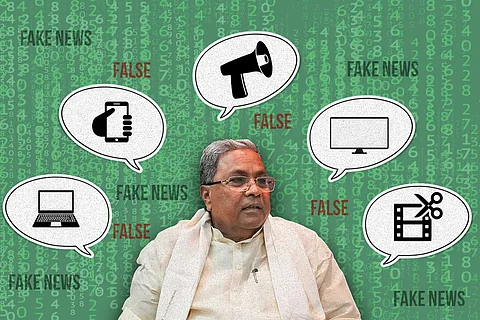

Barely four days before half of Karnataka goes to vote, the Bharatiya Janata Party (BJP) has raised the issue of reservation for Muslims, saying the Karnataka government led by Siddaramaiah has wronged 36 castes in Backward Classes by including Muslims. The BJP also said that the Siddaramaiah government had “committed historic injustice to the Backward Classes and deprived the constitutional right of Backward Classes and given it to Muslims.”
The precursor to their statement was a statement by the Chairman of the National Commission for Backward Classes (NCBC) Hansraj Ahir that the entire Muslim community as a backward caste for reservation purposes in the state undermined the principles of social justice. He further questioned the impact of such reservations on the overall framework of social justice, particularly in the context of local body polls.
But did the Siddaramaiah government really deprive the constitutional right of Backward Classes and give it to Muslims? The fact is, Muslims have been included in the Backward Classes list since 1977.
History of reservation for Muslims in Karnataka
LG Havanur’s report on the Karnataka Backward Classes submitted to the government in 1975, recognised Muslims as a Backward Class eligible for reservation. Based on the report’s recommendations, Muslims were categorised under Backward Communities (other categories being Backward Caste, Backward Tribe and Special Group) and an order was issued in March 1977 for providing reservation to Backward Class including Muslims. According to an order issued in May 1979, Muslims were placed in the Backward Communities group.
The grouping was changed when a commission headed by Venkata Swamy also recognised Muslims as a Backward Class eligible for reservation. Based on this commission’s recommendations, Muslims were categorised under Group C.
Later, a commission headed by Justice O Chinappa Reddy grouped Backward Classes under Category 1 (Most Backward), Category 2A (Relatively More Backward), Category 2B (More Backward), Category 3A (Backward), Category 3B (Relatively Backward) and Category 4 (Occupational Group). Accordingly, an order was issued in September 1994, where Muslims were placed under Category 2B. This means that the present reservation structure has been in place for 30 years.
A later commission headed by Prof Ravivarma Kumar removed the Occupational Group category and it was subsumed into other groups. Muslims continued to be placed in Category 2B. Seventeen Muslim communities were listed in Category 1 (most backward) and 19 Muslim communities are categorised under 2A (relatively more backward).
The OBC category holds 32% reservation. The 36 Muslim communities listed in categories 1 and 2A are also listed in the central list of OBCs. Only those who are determined not to be ‘creamy layer’ (Rs 8 lakh annual income or more) are eligible for reservation under the OBC category.
In 2023 before the Assembly elections, the BJP-led Basavaraj Bommai government removed the 4% reservations allocated to Muslims under 2B and decided to split it among Lingayats and Vokkaligas in 2C category and Lingayats in 2D category. The categories of Muslims under 1 and 2A would continue to get the benefit of reservation under OBC, the then Chief Minister Basavaraj Bommai had assured.
The scrapping of the 4% reservation was challenged in the Supreme Court. The state had then given an assurance to the court that it would not scrap the reservation and that the earlier policy would hold under further orders. As the matter is still pending before the Supreme Court, the Siddaramaiah government continued administrating under the same orders.
Supported by the Constitution
Providing reservations to Backward Classes for their well-being falls under the state list. The percentage of reservation varies in each state. The reservation is not communal and is based on social and educational backwardness. While some states provide reservations for Muslims as a whole, while other states provide reservations only to certain categories of Muslims.
States are supported by Article 15(4) of the Constitution which enables the State to make special provisions for the advancement of any socially and educationally backward classes of citizens or for the Scheduled Castes and the Scheduled Tribes.
They are also supported by Article 16 (4) which says that “nothing in this article shall prevent the State from making any provision for the reservation of appointments or posts in favour of any backward class of citizens which, in the opinion of the State, is not adequately represented in the services under the State.”